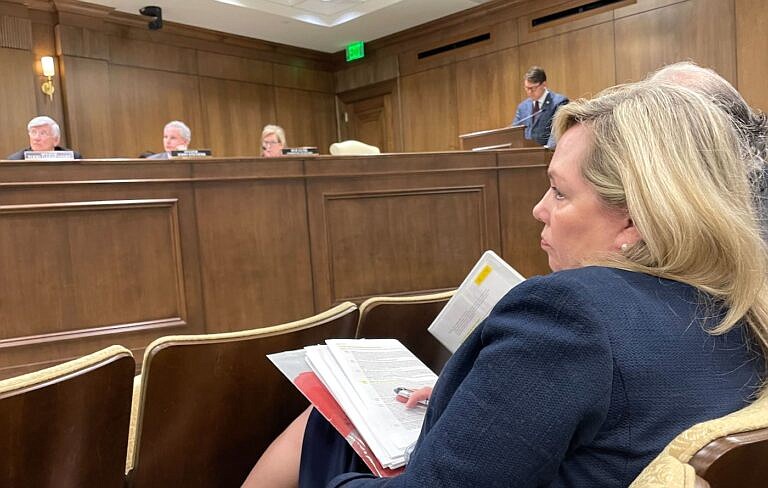A federal watchdog has found that the Tennessee Coalition to End Domestic and Sexual Violence unlawfully retaliated against and then forced out an employee who blew the whistle about potential misuse of federal funding.
The investigation by the Department of Health and Human Services Office of Inspector General details the experiences of Veronica Quinonez, an employee who was "constructively discharged" in 2019 after she raised concerns with her supervisors, including longtime executive director Kathy Walsh, according to the report obtained by the Tennessee Lookout and WPLN News, Nashville's public radio station.
Quinonez's concerns centered on being forced to answer phone calls from victims, some of them in crisis. It was a role that she said went against the strict rules of the U.S. Centers for Disease Control and Prevention grant that paid her salary.
According to the factual findings summarized in the report, Quinonez was directed to maintain two separate timesheets, one that reflected what she actually did at work, sometimes spending 30% of her time handling calls from abuse survivors and tracking down resources to aid them. The other timesheet showed what she was supposed to be doing under the terms of the $2 million violence prevention grant.
(READ MORE: New 988 hotline provides immediate help for mental health crises)
Quinonez said she was not the only employee tapped to take those calls.
"So we (had) people that literally worked on accounting and business and had no knowledge of sexual assault, domestic violence answering these phone calls," Quinonez said in an interview.
"And I told them that if somebody comes to us who is suicidal and somebody isn't trained in dealing with a crisis call like that, this could be really bad. We might not be able to handle this situation properly. I was told it was about being a team player and everybody had to help out."
Walsh declined to sit for an interview or respond to a list of questions, and instead joined with the chair of the nonprofit's board to send a statement disputing the federal findings. They note the coalition continues to cooperate with the federal government, and said they "look forward to favorably resolving this matter."
"We are aware of the allegations, but dispute any current conclusions and findings, and intend to fully rebut the same when we have the opportunity," the statement said.
The report recommends that whistleblower protection training be required at the coalition, as well as for federal CDC employees who worked on the DELTA program, which funded Quinonez's position.
It also recommends backpay for Quinonez, and it left the door open for any "alternative or additional" actions by the federal Department of Health and Human Services.
The Inspector General report focuses on actions by Walsh and Dawn Harper, the coalition's associate director at the time, between May and October 2019, and relies on personnel files, documents, emails and interviews with staff and board members, including Walsh and Harper.
Quinonez began working at the coalition in February of that year, as a program manager for a large grant: the $2 million DELTA Impact grant from the CDC, focused on violence prevention. Only nine state coalitions in the country have received what Quinonez calls a "trendsetting, groundbreaking" grant.
Her job was to manage educational programs statewide that teach people how to recognize and stop intimate partner violence.
But by mid-May, the report said, Harper directed Quinonez to begin answering calls from survivors of sexual and domestic violence. The coalition does not operate a crisis response hotline, but victims often don't know this.
"When someone calls a domestic violence hotline, most times it's life or death," said Carol Wick, an international expert on gender-based violence who once ran a women's shelter.
Staff who are not trained in crisis response "shouldn't be taking those calls. Period," Wick said.
Quinonez initially began answering the calls as she was directed to do, but began voicing concerns to her supervisors about whether spending her time aiding callers violated CDC rules. Guidelines for agencies receiving the DELTA grant, similar to many federal funding sources, require staff to perform only duties related to the grant.
Quinonez filed a grievance with the coalition's board on Oct. 3, 2019.
In a response to her on Dec. 18, Chairwoman Micki Yearwood said she had appointed a three-member panel of board members to investigate her complaints.
"The committee finds that there is no substantiation to any of the allegations or many thoughts you have put in your correspondence," Yearwood said in the written response reviewed by WPLN and the Lookout. "The investigation is closed."
Quinonez has since left Tennessee, embarking on a new career path of advising other nonprofits on how to prevent harm within their own workplaces.
"I ended up creating my own small business," she said, "so that nonprofits that do this work are better with their staff."
This story was jointly reported by Anita Wadhwani of Tennessee Lookout and Natasha Senjanovic of WPLN News. Read more at TennesseeLookout.com.
